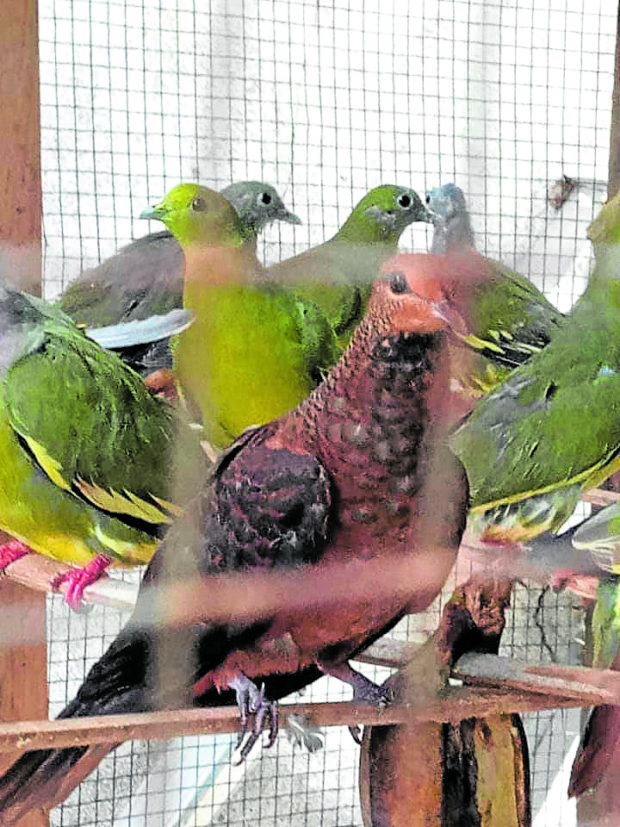Facebook asked to take down pages pushing wildlife trade

CAGED The Philippine cuckoo-dove (foreground) and green pigeons are among the commonly poached and traded birds online. —PHOTO COURTESY OF TRAFFIC
A private conservation group has sounded the alarm over an increasing trade of birds caught in the wild by people who turn to social media for cheap and easy means to promote the illegal market.
The Philippine Center for Terrestrial and Aquatic Research (PCTAR), which keeps track of the bird trade, also asked the regional offices of the Department of Environment and Natural Resources to find people behind a number of “site-specific” Facebook groups that are openly selling birds caught in Luzon.
One of the groups, the Batangas Wild Birds, has more than 6,000 members since it was created in May. Others were created specifically for traders and buyers from the provinces of Laguna and Cavite.
Emerson Sy, the PCTAR president, said he found increased activity online since community lockdowns were imposed early this year to contain the spread of the new coronavirus disease (COVID-19).
Common bird species, which were not traditionally traded, are now topping its list, the conservation group observed.
Article continues after this advertisementPalawan birds
Between 2018 and 2019, the commonly traded birds came mostly from Palawan island, among them the blue-naped parrot, the Palawan racket-tail and the Palawan hill myna. Sy said these birds had since moved down the list of poached birds this year.
Article continues after this advertisement“It was not really a change in [market] preference. But because there was no supply from Palawan [due to movement restrictions], traders resorted to any bird [available]. It has become like ‘anything goes,’” Sy said in a telephone interview on Monday.
A list from the nongovernment wildlife monitoring network Traffic showed that the top poached and illegally traded birds during the lockdown were: crested myna, black-naped oriole, white-eared brown dove, Philippine hanging parrot, large-billed crow, pink-necked green pigeon, spotted dove, brahminy kite, Philippine bulbul, Philippine scops owl, yellow-vented bulbul, and the lowland white eye.
Some species traded online were critically endangered.
An individual or a pair of birds sell from P400 to as much as P20,000 for a raptor.
Meaningless effort
Sy said poachers were using a “bait bird” to catch other birds in the wild. One was the use of a wired cage where the bait makes distress calls and attracts other birds.
Another is a crude trap, with a domesticated rooster as the bait, to draw jungle fowls.
Sy said the online bird trade appeals to hobbyists in Metro Manila that have turned wild birds into “disposable pets.”
Another cause for concern is the possible transmission of avian diseases since it is not properly regulated, he said.
In 2018, Facebook joined a global coalition to end wildlife trafficking, but wildlife specialists felt not much has been accomplished in taking “illegal content” off its platform.
Sy said Facebook’s mechanism for users to report illicit activities was just one of its “meaningless efforts.” INQ